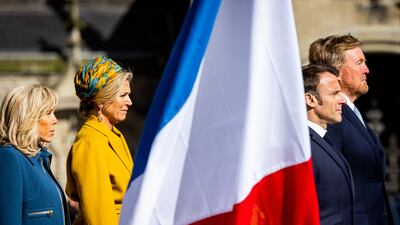French President Emmanuel Macron landed in Amsterdam on Tuesday for a two-day visit to the Netherlands, home to Europe’s most valuable tech firm ASML, in an attempt to strengthen European industry.
Mr Macron and his wife Brigitte were welcomed by King Willem-Alexander and Queen Maxima for the first state visit of a French President to the country in 23 years.
With Dutch politicians and industrialists, the French leader plans to discuss the way forward for Europe as the continent tries to bolster industrial production, particularly computer chips.
“We want to be open, we want allies we want good friends we want partners, but we want to be in situation to choose them — not to be 100 per cent dependent on them,” said Mr Macron in a speech in The Hague at the Nexus Institute.
Mr Macron said that the Covid-19 pandemic and the war in Ukraine have made Europe realise it was too dependent on imports.
“The EU was too much driven by a customer approach and not sufficiently by the citizen and producer approach,” he said.
The French President is looking to launch a “new economic doctrine” to “reconcile creating jobs, financing [Europe's] social model, dealing with climate change and being more sovereign”.
He laid out his vision for European sovereignty, which is based on five pillars: competitiveness, industrial policy, protection of European interests, reciprocity and co-operation.
Mr Macron said Europe could not watch its competitors — China and the US — launch massive industrial support programmes and not reciprocate.
The aim is to “make sure you are not trapped in a crazy situation the day something wrong would happen”, he explained.
At the start of his speech, Mr Macron was heckled by protesters, who shouted about climate change and France's controversial pension reform.
The French President responded by saying that those who do not respect the electoral process and elected leaders put democracy in danger. He then proceeded to give his speech.
Mr Macron made no reference to recent media interviews on China following a trip to Beijing, in which he called for Europe not to become entangled in China-Taiwan tension.
He made only passing references to Europe's chips industry, though it is currently at the heart of industrial tension between Europe, the US and China.
The Netherlands recently found itself caught up in US-China rivalry due to Dutch company ASML’s strategic position on the computer chips market.
ASML makes the machines to produce the most advanced computer chips and therefore has a near total monopoly on the market.
Last month, the Dutch government bowed to US pressure and announced restrictions on exports of the advanced semiconductor technology to China.
Mr Macron will meet ASML's chief executive Peter Wennink on Wednesday before a one-on-one meeting with Dutch Prime Minister Mark Rutte.
Mr Wennink has warned that limitations such as those imposed by the US would not stop China from gaining access to that technology.
He told the BBC in February that: “If the semiconductors cannot be made in China, they will be made in [South] Korea, in the US or in Europe or in Taiwan.”
Representatives of French-Italian company STMicroelectronics are part of the delegation accompanying the Mr Macron to the Netherlands.

The company has said it would team up with US semiconductor company GlobalFoundries to build a €6.7 billion chip factory in France.
The EU last year announced a €43 billion ($47 billion) plan — the Chips Act — to boost its semiconductor industry and catch up with the US and Asia.
France and the Netherlands are scheduled to sign an “innovation and sustainable growth pact”, Mr Macron's office said.
This will pave the way for announcements of “new co-operation” regarding semiconductor technology, quantum physics and energy.


